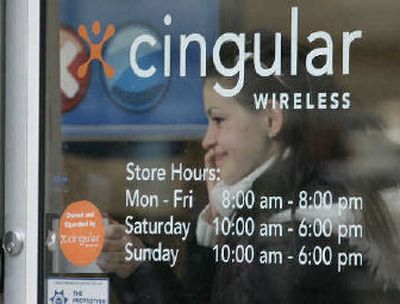New AT&T would cut up to 10,000 jobs

NEW YORK — One way AT&T Inc. hopes its $67 billion proposed merger with BellSouth Corp. will pay off is by allowing it to get rid of redundant operations.
That means up to 10,000 job cuts over three years, mostly through normal employee turnover rather than layoffs, AT&T Chief Financial Officer Rick Lindner said Monday.
The deal, expected to close next year after shareholder and regulatory approval, would form the nation’s largest phone company by any measure. It would have nearly half of all lines, be the largest cell-phone carrier and the largest provider of broadband Internet service.
Because the merger would effectively unite three companies — AT&T, BellSouth and Cingular Wireless LLC, their joint venture — executives expect that plenty of overlapping functions can be eliminated.
“This merger will allow us to move to a single brand for wireline, for wireless, for business and consumer, and that’s AT&T,” said Randall Stephenson, AT&T’s chief operating officer. “A single brand is much more cost efficient and far more effective.”
If the announced job cuts aren’t offset by hiring, they may be felt particularly strongly in Atlanta, where both BellSouth and Cingular are based. Cingular’s headquarters will remain there, but San Antonio, where AT&T is based, will be corporate headquarters.
Georgia Gov. Sonny Perdue and Atlanta Mayor Shirley Franklin said Monday they both will fly to Texas soon to try to persuade AT&T’s executives to move their headquarters to Atlanta.
“It’s hard to replace BellSouth,” Franklin said. “They’ve contributed so much over the last decade. We’re anxious for their national headquarters to move here.”
Before the cuts, the combined company would have around 317,000 employees, including Cingular.
The 10,000 planned cuts are in addition to the 26,000 job cuts AT&T has already announced — 13,000 due to SBC’s acquisition of AT&T Corp., which closed in November, and 13,000 due to shifting priorities in its operations. The combined SBC-AT&T took the name AT&T Inc.
At the Communications Workers of America, which would have about 200,000 workers at the combined company, spokeswoman Candice Johnson said the merger would be a “good opportunity for job growth” as the company expands into new technologies.
“We’re not looking for job losses at all,” Johnson said. The union has not yet endorsed the merger.
AT&T expects the acquisition announced Sunday to save it $2 billion annually at first, increasing to $3 billion a year by 2010.
Slightly more than one third of the savings would come from reduced labor costs and consolidation of support functions and corporate staff, Lindner said.
More savings from the proposed acquisition would come from reduced advertising expenses and combining the companies’ backbone network and information-technology operations.
“Over the last couple of years as we have operated Cingular and our Yellow Pages venture, it became clear that there was a lot of duplication that could be eliminated,” said Duane Ackerman, chief executive of BellSouth.
Under the terms of the deal, AT&T is paying 1.325 of its own shares for each BellSouth share. AT&T shares closed Monday down 97 cents, or 3.5 percent, at $27.02 on the New York Stock Exchange.
That put the value of the offer at $35.80 per BellSouth share. Those shares rose $3.04, or 9.7 percent, to close Monday at $34.50.
The narrow difference between the AT&T offer and the market price for BellSouth shares indicated that investors believe the merger is almost certain to get through regulators.
AT&T plans to buy back stock worth at least $10 billion in the next two years, effectively paying for the premium given to BellSouth shareholders in cash, executives said.
David Kaut, a telecom regulatory analyst at the financial services firm Stifel Nicolaus & Co., said the merger would likely gain approval with modest conditions, such as divestitures of business lines in overlapping territories.
The deal would substantially expand the reach of AT&T, already the country’s largest telecommunications company by the number of customers served. BellSouth is the dominant local telephone provider in the Southeast.
The merged company would have 70 million local-line phone customers, 54.1 million wireless subscribers and nearly 10 million broadband subscribers in the 22 states where they now operate.